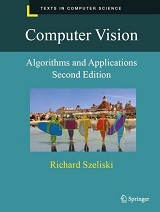
|
FreeComputerBooks.com
Links to Free Computer, Mathematics, Technical Books all over the World
|
|
- Title: Computer Vision: Algorithms and Applications
- Author(s) Richard Szeliski
- Publisher: Springer; 2nd Edition (January 5, 2022); eBook (Final Draft, September 30, 2021)
- Permission: "This electronic draft is for non-commercial personal use only, and may not be posted or re-distributed in any form."
- Hardcover: 947 pages
- eBook: PDF (1232 pages, 38.8 MB)
- Language: English
- ISBN-10: 3030343715
- ISBN-13: 978-3030343712
- Share This:

|
This book explores the variety of techniques used to analyze and interpret images. It also describes challenging real-world applications where vision is being successfully used, both in specialized applications such as image search and autonomous navigation, as well as for fun, consumer-level tasks that students can apply to their own personal photos and videos.
More than just a source of “recipes,” this exceptionally authoritative and comprehensive textbook/reference takes a scientific approach to the formulation of computer vision problems. These problems are then analyzed using the latest classical and deep learning models and solved using rigorous engineering principles.
- Structured to support active curricula and project-oriented courses, with tips in the Introduction for using the book in a variety of customized courses
- Incorporates totally new material on Deep Learning and applications such as mobile computational photography, autonomous navigation, and augmented reality
- Presents exercises at the end of each chapter with a heavy emphasis on testing algorithms and containing numerous suggestions for small mid-term projects
- Includes 1,500 new citations and 200 new figures that cover the tremendous developments from the last decade
- Provides additional material and more detailed mathematical topics in the Appendices, which cover linear algebra, numerical techniques, estimation theory, datasets, and software
- Dr. Richard Szeliski has more than 40 years' experience in computer vision research, most recently at Facebook and Microsoft Research, where he led the Computational Photography and Interactive Visual Media groups.
- Computer Vision, Machine Vision, and Image Processing
- Deep Learning and Neural Networks
- Digital Signal Processing (DSP), Sound and Imaging Processing
- Computer Graphics and Digital Images
- Artificial Intelligence, Machine Learning, and Logic Programming

- Computer Vision: Algorithms and Applications, Second Edition (Richard Szeliski)
- The Mirror Site (1) - PDF (Direct PDF)
- The Mirror Site (2) - PDF (Direct PDF)
-
 Foundations of Computer Vision (Antonio Torralba, et al.)
Foundations of Computer Vision (Antonio Torralba, et al.)
An accessible, authoritative, and up-to-date computer vision textbook offering a comprehensive introduction to the foundations of the field that incorporates the latest deep learning advances.
-
 Distant Viewing: Computational Exploration of Digital Images
Distant Viewing: Computational Exploration of Digital Images
This book presents a new theory and methodology for the application of computer vision methods to the computational analysis of collected, digitized visual materials, called “distant viewing”.
-
 Developing Graphics Frameworks with Python and OpenGL
Developing Graphics Frameworks with Python and OpenGL
It shows you how to create software for rendering complete three-dimensional scenes, explains the foundational theoretical concepts as well as the practical programming techniques that will enable you to create your own animated and interactive worlds.
-
 Programming Computer Vision with Python: Tools and Algorithms
Programming Computer Vision with Python: Tools and Algorithms
This book is a hands-on introduction to computer vision using Python. It gives an easily accessible entry point to hands-on computer vision with enough understanding of the underlying theory and algorithms to be a foundation for students, researchers.
-
 Computer Vision: Models, Learning, and Inference (Simon Prince)
Computer Vision: Models, Learning, and Inference (Simon Prince)
The book starts from the basics of probability and model fitting and works up to real examples that the reader can implement and modify to build useful vision systems. The detailed methodological presentation is useful for practitioners of computer vision.
-
 Computer Vision Metrics: Survey, Taxonomy, and Analysis
Computer Vision Metrics: Survey, Taxonomy, and Analysis
This book provides an extensive survey and analysis of over 100 current and historical feature description and machine vision methods, with a detailed taxonomy for local, regional and global features.
-
 Mastering OpenCV 4: Computer Vision & Image Processing Apps
Mastering OpenCV 4: Computer Vision & Image Processing Apps
This book targets computer vision engineers taking their first steps toward mastering OpenCV. Keeping the mathematical formulations to a solid but bare minimum, it delivers complete projects from ideation to running code, targeting current hot topics, etc.
-
 Computer Vision (Dana H. Ballard, et al)
Computer Vision (Dana H. Ballard, et al)
This book is the construction of explicit, meaningful descriptions of physical objects from images. Image understanding is very different from image processing, which studies image-to-image transformations, not explicit description building.
-
 Numerical Algorithms: Computer Vision, Machine Learning, etc.
Numerical Algorithms: Computer Vision, Machine Learning, etc.
This book presents a new approach to numerical analysis for modern computer scientists, covers a wide range of topics - from numerical linear algebra to optimization and differential equations - focusing on real-world motivation and unifying themes.
-
 Computer Vision (Xiong Zhihui)
Computer Vision (Xiong Zhihui)
This book presents computer vision on application of robotics, and on advanced approachs for computer vision (such as omnidirectional vision), research on RFID technology integrating stereo vision to localize an indoor mobile robot, etc.
-
 Digital Video Concepts, Methods, and Metrics (S. Akramullah)
Digital Video Concepts, Methods, and Metrics (S. Akramullah)
This book is a concise reference for professionals in a wide range of applications and vocations. It focuses on giving the reader mastery over the concepts, methods and metrics of digital video coding.





